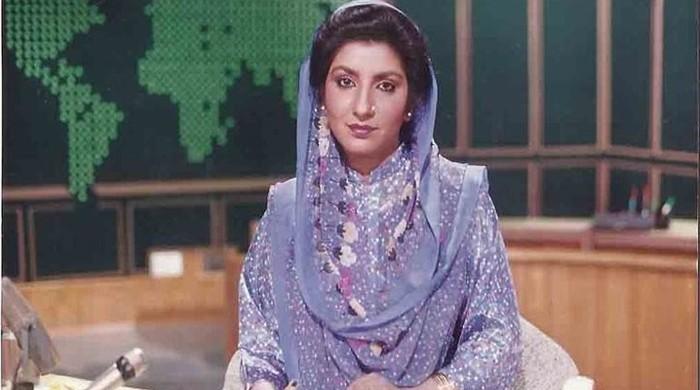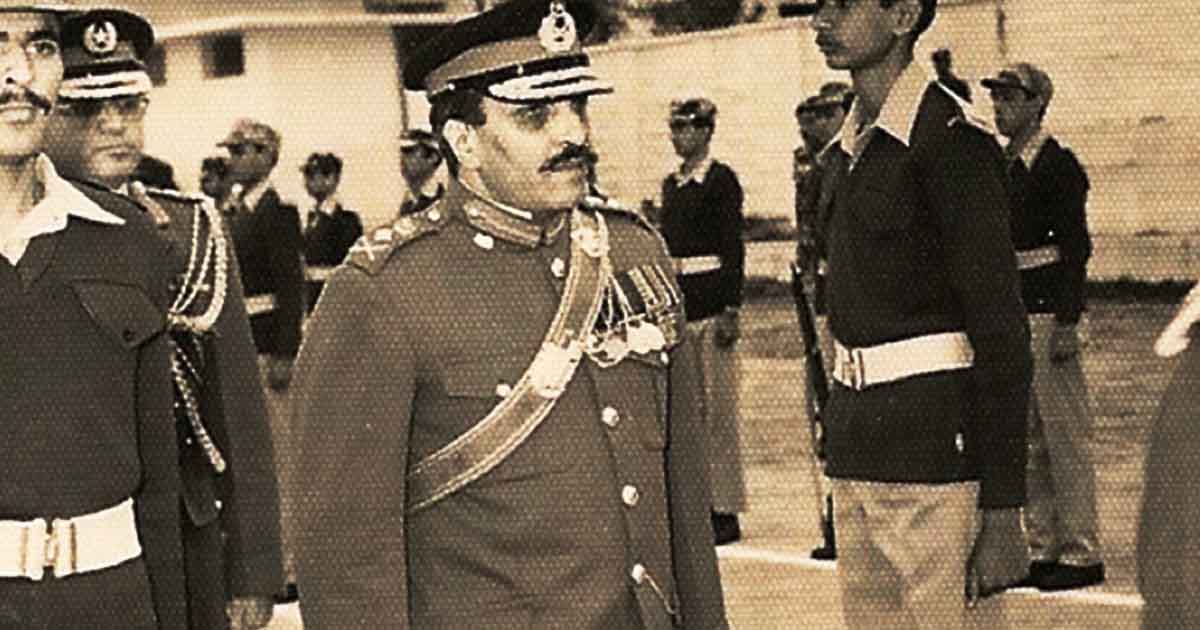General Zia-ul-Haq, may have had no control over international events which came to epitomize his era such as the Soviet invasion of Afghanistan or the Iranian revolution; but he did determine Pakistan’s outlook towards these, and along with his internal policies after taking over as Martial Law Administrator, he has left lasting effects long after his death.
He is still remembered for his role in the Afghan Mujahadeen, the Islamization of Pakistan’s laws and society, and for cultivating and developing later three-time PM Nawaz Sharif’s political career.
Zia Assumes Power
March 1, 1976
Prime Minister Zulfiqar Ali Bhutto appoints Lieutenant General Muhammad Zia-ul-Haq as the Chief of Army Staff (COAS). He superseded seven senior generals

June 14, 1977
In the backdrop of continuous impasse between the Pakistan National Alliance (PNA) and Bhutto, the latter feared a military takeover in a politically destabilized environment. PM Bhutto tells his senior generals in the Cabinet room of the PM Secretariat – that running a country was ‘no bed of roses’ General Zia stands up and assures that he and his colleagues have no thought of taking power.’
July 3, 1977
After another failed meeting with the PNA representatives which yielded no positive results, a cabinet meeting is held. General Zia again assures Bhutto of his ‘complete support’: ‘Please rely on us, we are your strong arm.’
Night between July 4-5, 1977
Operation Fairplay comes into action. General Zia declares martial law throughout the country; assumes the position of Chief Martial Law Administrator; National and Provincial assemblies were dissolved; Bhutto, his cabinet colleagues, and top PNA leaders all placed under ‘protective custody’, all political activities banned. The next day, in a radio broadcast, Zia promises the nation that elections would be held within 90 days.

October 1, 1977
Postponement of general elections scheduled for October 18, 1977.
Steps Taken by Zia
September 14, 1978
General Zia assumes office of President along with COAS, and Chief Martial Law Administrator.
April 4, 1979
Zulfiqar Ali Bhutto hanged at Rawalpindi Central Jail.

February 7, 1979
The first step towards Islamization: under the Constitution (Amendment) order, 1979 and Presi – dent’s Order 3 of 1979. PLD 1979 Central Statutes 31, superior courts were empowered to decide on the question of whether any Pakistani law is repugnant to the injunctions of Islam.
February 9, 1979
A package of Islamic laws was promulgated through Hudood ordinances which included crimes related to theft, robbery, rape, adultery, use of intoxicants, and false testimony or accusation of adultery, and introduced punishments such as lashes and imprisonment. Women were told to cover their heads in schools, TV and many other public spaces.

June 20, 1980
Forcible collection of zakat made compulsory through the issuance of Zakat and Ushr ordinance, leading Shias to rise in violent protests.
1980
Federal Shariat Courts were established and capacitated with powers which were previously conferred upon the Shariat branches of the High Courts on February 7, 1979. Demonstrating Zia’s lack of confidence in the superior courts and further weakening the judiciary.

1981
General Zia places the country into the middle of the Afghan struggle. Despite all its short-term monetary benefits, the war incurred a high longterm cost on Pakistan in form of refugees and later drug proliferation and radicalism.
Between January and December 1980, an estimated 80,000 to 90,000 refugees crossed the border every month, and in 1989 the total number peaked at 3,270,000. In 1982, the erstwhile Pakistan Narcotics Control Board showed 1.3 million drug addicts. In 1988, the number rocketed to 2.24 million. By 2018 it was estimated at 7.6 million in 2018.

December 19, 1984
Zia holds a referendum to seek the endorsement of the process of Islamization and extension of his regime. Cunningly, the question is couched in such language that could not be answered in negative.
Read more: An overview of Pakistani politics from 1947 to Gen. Zia
‘‘Whether the people of Pakistan endorse the process initiated by General Muhammad Zia-ul-Haq, the President of Pakistan, for bringing the laws of Pakistan in conformity with the injunctions of Islam as laid down in the Holy Quran and Sunnah of the Holy Prophet (PBUH) and for the preservation of the ideology of Pakistan, for the continuation and consolidation of that process, and for the smooth and orderly transfer of power to the elected representatives of the people’’.
Conducted manipulation of government machinery to seek the desired results, it gave him further five years as President.

Official Results
According to CEC, 62% Pakistanis cast their votes, 97.7% of them answered in affirmative.
March 2, 1985
The Revival of the Constitution Order (RCO) was promulgated – primarily designed to consolidate the president’s power it was a presidential order which amended the existing constitution to suit the needs of the ruling military junta. Its most profound contents included articles 62 and 63 which provide for the qualification criteria of members of national and provincial legislatures. In 2017, it was these articles that disqualified PM Nawaz Sharif.

November, 1985
The Eight-Amendment – a reaffirmation of the RCO with minor amends – was passed by the newly elected Majlis-e-Shoora formed under martial law. It transformed the parliamentary system of Pakistan into a semi-presidential system and granted the powers to the president to dissolve the National Assembly. Moreover, it gave General Zia legitimacy to continue as president till 1990. This step would haunt Pakistani politics for years.
May 29, 1988
Zia dissolved the National Assembly and removed the prime minister under article 58(2)b of the amended Constitution and announced elections would be held in November 1988.
August 17, 1988
General Zia is blown up in an airplane in Bahawalpur.















